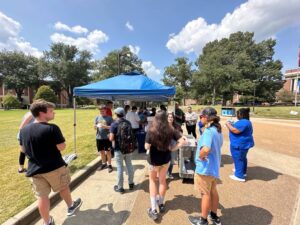It’s been said that who leads your college ministry will largely determine who your college ministry will reach. I’ve seen this to be true over and over again. The selection of staff and lead team members matter, and it ripples (or doesn’t) throughout campus.
When selecting lead teams, select leaders from the parts of campus that you want to reach. If you want to reach all sections of campus, ask God to open doors with leaders who represent all parts of campus. This includes gender, melanin, and campus activities such as sports, clubs and Greek life. Seek students who spend time in a variety of campus locations as well, including an assortment of residence halls, apartment complexes, and academic buildings.
Share a clear and honest vision and invite leaders into the vision. King Solomon’s wisdom in Proverbs 29:18 speaks to this; “Where there is no vision, the people perish.” Repeat the vision of your ministry often, keeping leaders on track and affirming the part they play in it.
Enlist people who are NOT like you yet have chemistry with you and are unified with the vision of your ministry. Try to include people who are introverts and extroverts, morning people and night owls, planned and spontaneous, detailed and big picture, grace and truth, risk takers and safe players. Paul encourages believers in I Corinthians 9:20 to “be all things to all people so by all means possible some might be saved.”
Engage people who are already leading, not necessarily in your ministry but on campus. These are the students who people want to be around. If they throw a party, everyone will want to come. In Henry Blackaby’s Spiritual Leadership, he states that “a spiritual leader leads all people not just church people.”
Some common characteristics of next-level leaders include:
1. Next-level leaders can lead themselves.
Spiritually and emotionally, they aren’t perfect but they are committed to the journey of growth. John Maxwell has said that “the secret of your future is found in your daily routine.” Eugene Peterson writes, “The spiritual life is long obedience in the same direction.” Next-level leaders are committed to following Jesus, one good habit at a time.
2. Next-level leaders relate well to a wide variety of people.
Romans 12:10 says, “Love each other with genuine affection, and take delight in honoring each other.” This kind of leader can walk in the middle of campus and be at home with whoever they may find there, showing honor to the sinner and the saint alike.
3. Next-level leaders are humble.
Philippians 2:3-4 says, “Don’t try to impress others. Be humble, thinking of others as better than yourselves. Don’t look out only for your own interests but take an interest in others too.” They have the correct perspective about their own weakness, sin, and need for God. This allows them to easily enter into another’s life with grace and humility.
4. They are spiritually aware.
We read in Galatians 5:25, “Since we are living by the Spirit, let us follow the spirit’s leading in every part of our lives.” It truly is a paradox – God has called us to do something that only He can do. Spiritually aware leaders get this.
5. Next-level leaders are eager for more.
Jabez’s mom named him a Hebrew word similar to a word meaning distress or pain because his childbirth was so painful. He prayed the opposite of this for his life, and God granted his request. His prayer is found in I Chronicles 4:10.
“Oh, that you would bless me and expand my territory? Please be with me in all that I do, and keep me from all trouble and pain?” Next-level leaders hope for more, pray for more, and plan for more!
6. They are high-capacity leaders.
Galatians 6:10 teaches, “Therefore, whenever we have the opportunity, we should do good to everyone…” Next-level leaders tend to respond to opportunity with, “YES!” They are committed to excellence, which is different than being a perfectionist, and they don’t get too bent out of shape with lots of moving parts.
7. Next-level leaders have a bend for both visionary leadership and practical leadership.
They will likely have a natural gift of one or the other, but they see the value of both seeing the big picture of where we would like to go and how we can move from point A to point B.
Next-level leaders need and appreciate several things from you, including clarity, freedom, and time. Lead with clarity. Let your leaders know what you want from them, what result is desired, and the why behind the tasks. Repeat the why or the vision often. Give your high-capacity leaders freedom to lead with a safety net if needed. Show them how something is done. Do it with them. Watch them do it and give feedback. Finally, let them do it alone. Let them know you are in it with them and have their back. Failing forward is still a win. Give them regular time with you to share life, speak truth, and develop them as leaders and disciples. This can be as little as 45 minutes every two weeks or as much as an hour per week, but the key is for it to be a consistent priority.
Once these high-capacity leaders say yes to serving on your team, invest in them in a way that makes them want to continue!
Linda Weir is Director of Ministry at Pinelake Church in Starkville, Mississippi. You can follow Pinelake’s Starkville campus on Instagram @pinelakestarkville.






